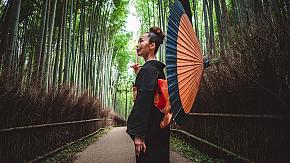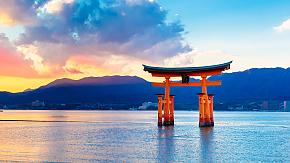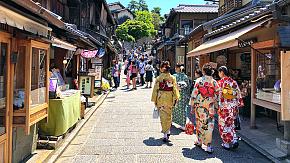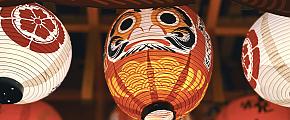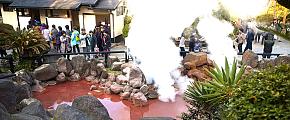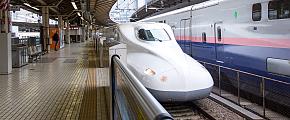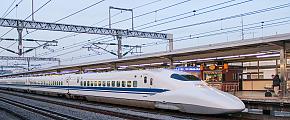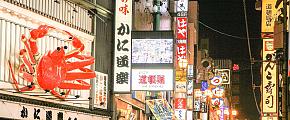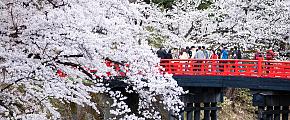Japanese Money Yen: Currency Exchange & JPY Tips
Japanese Yen (JPY), the money in Japan is notes and coins that come with different designs and colors, featuring the image of the national flower Chrysanthemum, the national cedar trees, and other symbols. Whether you are planning a Japan tour or are interested in the Japanese currency, this guide will provide all the necessary information you need.
What Is the Currency in Japan
The official Japanese money is yen (円), abbreviated as JPY and with the symbol ¥. The Japanese yen comes in two forms: banknotes issued by the Bank of Japan and coins issued by the Japanese government, with different denominations.
|
Japanese Money Yen (JPY)
|
|
| Banknotes | 1000, 2000, 5000, 10000 JPY |
| Coins | 1, 5, 10, 50, 100, 500 JPY |
Among different nominal values, 1000 yen and 5000 yen are the most commonly used banknotes to pay for shopping or dining bills in Japan.
Even with its minimal value, the coin is an integral part of Japanese currency. They are also used in vending machines, donations, and temple worship. Preparation for a certain amount of Japanese coins will make it easier to give change and buy what you want in some small retail stores.
What Can 1000 Yen Buy in Japan
1000 yen is roughly the equivalent of a $10 bill (about 6 to 7 USD), enough for an order of McMeal, a bowl of ramen, 2 glasses of beer, 2 cups of cappuccino, or 2 tickets for the hot springs, museums, and temples, which is neither too much nor too little.
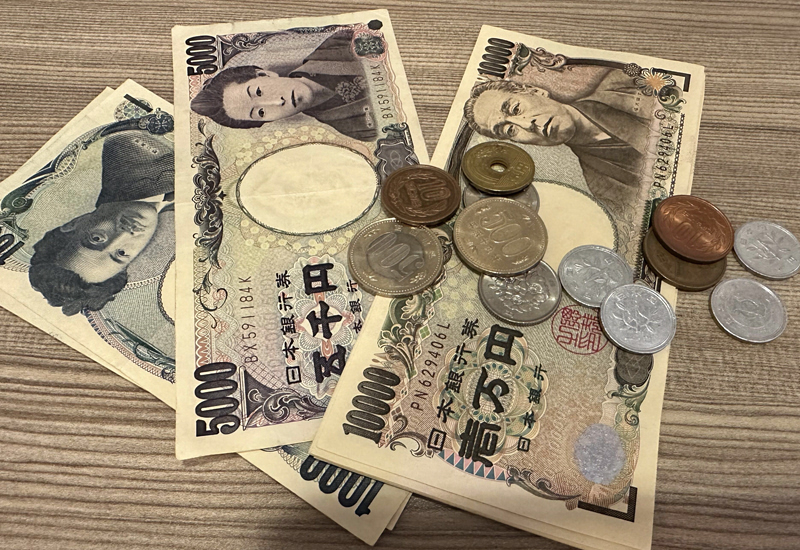 Japanese Yen
Japanese Yen
Exchange Rates
For your reference, the table below shows the Japanese Yen's (JPY) exchange rate against a number of major currencies, including the US Dollar (USD), British Pound (GBP), Australian Dollar (AUD), Euro (EUR), and more. (Updated December 2025)
| Foreign Currency Value | Value in Japanese Yen |
| 1 US Dollar | 157 yen |
| 1 British Pound | 209 yen |
| 1 Australian Dollar | 104 yen |
| 1 Euro | 182 yen |
| 1 New Zealand Dollar | 91 yen |
| 1 Canadian Dollar | 113 yen |
Should I Exchange JPY Before Traveling to Japan
For visitors from North America, Europe, and Australia, it's generally better to exchange Japanese yen after arriving in Japan, for major currencies traded in Japan, such as the USD and EUR, are often more favorable and convenient for the bulk of the exchange. For travelers from other countries, exchanging currency before your trip may be more advisable.
Regardless of where you're coming from, it's always a good idea to carry a small amount of Japanese yen for immediate convenience upon arrival.
How to Get Japanese Yen
Currency Exchange Outlets
Currency exchange is available at most major banks, post offices, and some major hotels in Japan. Banks typically charge around 4.3% per $100 exchanged, while using a credit or debit card can cost around 1.6% and high-end hotels around 2.5%. Keep in mind that rates can vary by location. In major cities such as Tokyo, you'll find plenty of banks and post offices that offer secure exchange facilities.
Other locations, such as international airports, large hotels, and department stores, also offer quick exchange services, but these unofficial money changers often offer less favorable rates and may charge additional fees.
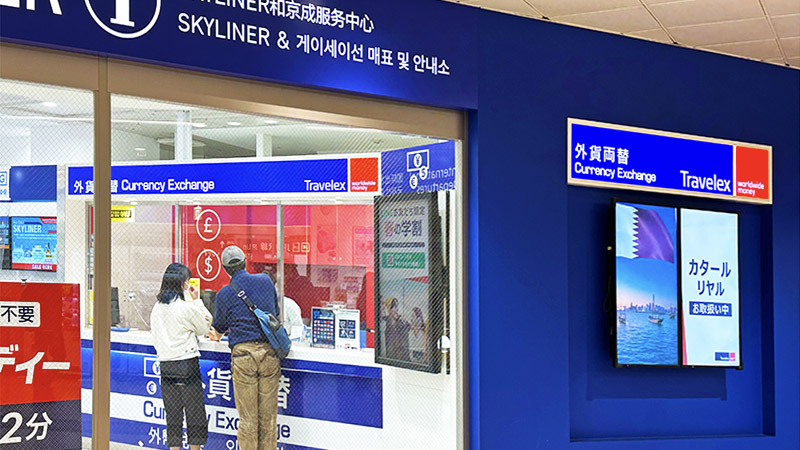 Currency Exchange Service at International Airport
Currency Exchange Service at International Airport
ATM Withdrawal
ATM withdrawal is another way to get Japanese money. ATMs are located almost everywhere nationwide, and you can find one in post offices, supermarkets, shopping malls, and convenience stores (7-Eleven, Lawson, or Family Mart).
They offer different service hours depending on regions, while convenience store ATMs are available 24/7 (24 hours a day, seven days a week), and English services are also available at most ATMs. In general, it is free to withdraw money from ATMs between 9 am and 5 pm on weekdays, while a fee of around 100-300 yen (about 1-2 US dollars) will be charged at other times.
Travelers's Checks
Travelers' checks are less widely accepted in Japan, but can still be used in some locations. Major banks such as Mitsubishi UFJ Bank, Sumitomo Mitsui Banking Corporation, Mizuho Bank, large and high-end hotels, some major travel agencies, and foreign exchange shops may accept traveler's checks, but it is recommended to ask in advance.
Payment Methods in Japan
JPY Cash
Although Japan is technologically advanced, cash is still the main payment method. It is accepted in most places, such as restaurants, izakayas, street food stalls, markets, public transportation, tourist attractions, vending machines, donations at shrines and temples, souvenir shops, and more. Preparing cash is necessary to make your Japan tour smooth and comfortable.
Credit Cards
Credit cards, such as Visa, Mastercard, and JCB (Japan Credit Bureau), are easy to carry and quick to pay and have become an increasingly accepted form of payment in major cities like Tokyo, and Osaka. This form of payment is accepted in many mid to high-end hotels, department stores, shopping malls, some boutiques, and train stations.
IC Cards
IC cards, or rechargeable "smart" cards like Suica and Pasmo, allow you to conveniently make payments by touching the card to a card reader for about a second.
They are primarily used for public transportation payment in big cities, such as bus, train, metro, and monorail fares. In addition, IC cards are accepted at vending machines, shops, cafes, restaurants, and station kiosks.
You can buy the card at airports, train stations in most cities, and some regional convenience stores. The usual initial fee of 2000 yen includes a 500 yen refundable deposit and the initial 1500 yen. You can return it to the station window where you purchased it, and the remaining balance on the card and the deposit will usually be refunded. Most companies will deduct a handling fee of about 220 yen.
How Much Does A Japan Tour Cost
The cost of a typical trip to Japan varies depending on your travel style. For a budget trip, expect to spend around 6,000-8,000 yen per day, which covers basic accommodation, simple meals, and essential activities. A mid-range trip will cost about 12,000-15,000 yen per day, allowing for more comfortable accommodation, better meals, and more tourist activities. For a more luxurious experience with high-end hotels, fine dining, and premium activities, you may need around 20,000-30,000 yen per day. Actual costs will vary based on your personal preferences and travel plans.
Money Tips in Japan
- It is a common practice to pay or receive money with both hands or upon a tray (If the tray is provided).
- Service charge or tipping is not common in Japanese culture, because it can be seen as offensive and disrespectful.
- It's important to form an orderly line when you're waiting for payment because order and formality are placed great emphasis in Japanese culture.
- Try not to recount the change you accepted in front of the cashier, as it is seen as a rude way of showing your distrust of his or her counting skill.
Plan Your Japan Tour With Odynovo
Book and start your Japan tour with Odynovo! Whether you're dreaming of cherry blossoms, historic temples, or vibrant city life, we'll make it easy and comfortable. Don't hesitate to contact us or write to [email protected]!
Related Posts You May Like
What Our Clients Say
Explore the latest verified reviews of Odynovo's travel services on Tripadvisor, Google, Trustpilot, Product Review and more trusted platforms.

